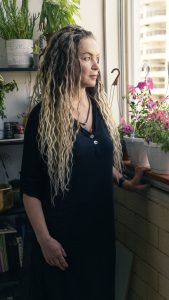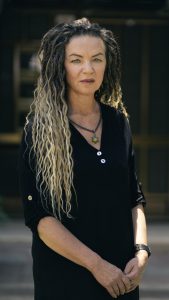Exhibition of portrait shots - woman of valor
On February 24, 2022, the lives of millions were changed when they found themselves in the midst of a violent, bloody military conflict Europe opened its doors to tens of thousands of refugees, and thousands of them arrived in Israel, most elderly, women and children.
Meanwhile, Israeli media is engaged in a heated discussion whether to receive or reject these refugees . After several weeks of combat, the subject of refugees is no longer in the headlines
Today, months after arriving in Israel, we will meet “face to face” with eleven of them .
In this cooperative photography project, Inna Hazanov and Kobi Goffer photograph brave women, women of valor, that left their tranquil lives, and overnight, became refugees in a strange land. They left their spouses behind (who remained to fight) as well as their families , and took their children and a few vital possessions.
The exhibition of portrait shots – “Woman of valor “ brings the moving story of these women, who succeeded in escaping the war zones in the Ukraine. These featured women represent the thousands like them who that live in Israel and throughout Europe, and only aspire to returning to ordinary life.
Inna Hazanov, who has a B.S. in Industrial Engineering from the Technion, is a graduate of the commercial photography program at the Technion’s Continuing Education School, Inna is a professional photographer who specializes in portraits and promotional material.
Kobi Goffer, who founded and directs the Technion’s Center for Photography in the School of Continuing Education has a master’s degree in Photography and new media (a.f.m.). Kobi is a distinguished professor at the Technion, and has received “ Teaching excellence “ award from the Technion President on several occasions. Kobi specializes in staged photography , promotional materials and digital editing.
This project was realized through the joint efforts of Technion’s Azrieli Center for Photography in the School of Continuing Education , and the Technion’s Elyachar Central Library.
The story behind the photographs
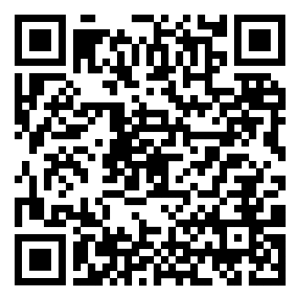
I’m from Kiev, my neighbourhood ‘Obolon’ was the first that Russian soldiers entered in the invasion of the city on the 24th of February. That day I woke up at five in the morning to the sound of loud explosions of an unknown origin. The fear was so great that I called my daughter, who lives with her partner in Israel, to say my goodbyes. My daughter and her partner helped me cope with the initial shock and directed me to go to Lviv. At first I hesitated and wasn’t sure what to do. However, explosions, destruction and street fights that started to develop right in front of my house, finally convinced me that I needed to save myself.
We got into a friend’s car and started driving away from the city, hearing explosions above us. At one of the junctions we saw Russian forces that had entered the city at the traffic light in front of us and only by a miracle we managed to escape.
Within a day we covered a distance of 540 km and reached Lviv. From there I continued my journey towards the Polish border by bus alone. The bus did not reach the border itself and I, along with everyone on it, had to continue on foot. Luckily, among the refugees on the bus, there was also an Israeli hockey player – Kennedy Eliezer Sharabtov. Thanks to his resourcefulness and the diplomatic assistance he received, we reached the border safely.
Now I live with my daughter and her family, enjoy helping raise grandchildren and hope to return to my home when this is all over. My elderly parents who could not leave Ukraine, stayed in Kiev and so did other relatives and friends. I also left my business – an African braiding studio. The war disconnected relationships I had with relatives in Russia and Belarus. This alienation is especially noticeable when you think about all the good people, complete strangers, who helped me along the way.
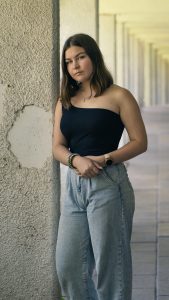
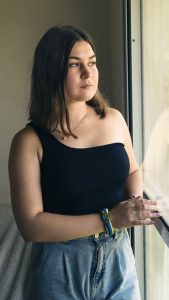
I came from Chernomorsk (Odessa district) and the war caught me completely by surprise. On Thursday the 24th of February I was supposed to participate in a shooting competition in Lviv but instead that morning began with the noise of explosions. We immediately understood that a war had begun and all our plans for the future changed at once. My family and I crossed the border to Moldova at the beginning of March, and even though it is only 80 km away, the journey took us 36 hours. Many like us were leaving, so there was heavy traffic on the road. Moreover, we ran out of water and food. After two weeks in Moldova, we arrived in Israel.
I live with my mother, my younger brother and sister and my mother’s husband who has an Israeli citizenship. I have relatives and friends who stayed in Chernomorsk. I also left my cats there. I am continuing my third year of undergraduate studies in psychology online. At first I had many concerns, but a great support of my relatives helped me acclimate.
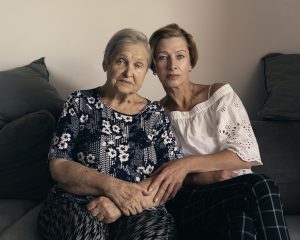
I am 87 years old and I come from Mariupol. After a childhood spent in an orphanage, I built my life by myself and raised two daughters. One of them lives with my grandson in Israel. The war caught us by surprise and it took us a whole month to convince ourselves to leave.
On the 28th of March, after we had attended the funeral of a neighbor killed in the bombing of the city, my daughter, my two twin granddaughters (they entered the 9th grade this year) and I took our belongings and left towards the border with Moldova. The journey to the border took us 14 days during bombing, through many military checkpoints. It’s hard to describe what we went through on this journey: sleeping in parks and dubious hotels. We saw destruction and death in the streets with our own eyes.
All the way to Moldova we were helped by volunteers. Words cannot describe how thankful I am for all the help they gave us. My daughter, who lives in Israel, also supported us with everything she could. I have no more relatives left in Ukraine, but I have an apartment there, in which friends whose house was destroyed during bombing currently live. I hope one day I can go back to my apartment.
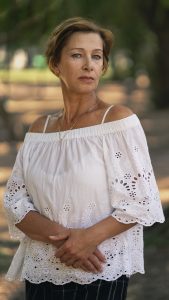
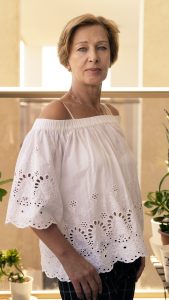
The war caught us by surprise and it took us a whole month to convince ourselves to leave. On the 28th of March, after we had attended the funeral of a neighbor killed in bombing of the city, we took our belongings and left towards the border – my mother, my two twin daughters (they entered the 9th grade this year) and I.
The journey to the border with Moldova took us 14 days – during bombing, through many military checkpoints. It’s hard to describe what we went through on the way: sleeping in parks and dubious hotels. We saw destruction and death in the streets with our own eyes.
All the way to Moldova we were helped by volunteers. Words cannot describe how thankful I am for all the help they gave us. My sister, who lives in Israel, also supported us with everything she could. I have no more relatives left in Ukraine. I hope one day I can come home.
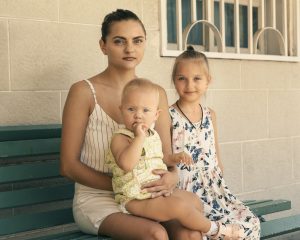
I came to Israel from Dnipro. On February 23rd I went to bed, with the intention of taking my eight-year-old daughter (Miroslava) to school in the morning as usual. At first I only saw the messages on my phone and did not hear distant explosions. However relatives confirmed that they had heard explosions near them and we realised that a war had begun.
The beginning was a terrible time for me. I didn’t know what to do and I cried for days. At night we all slept clothed on mattresses on the floor in the basement. My little one (Milena) was only seven months old at the time. About three weeks passed like that, until on March 9th we left with a joint shuttle towards the border with Romania. Two days after we had left Dnipro a bomb hit the building we used to lived in.
All I had was one suitcase, my girl’s backpack and a bag with diapers and baby’s food. And so without knowing where I was heading, we arrived in Romania. I stayed there for 20 days.
A relative, who had been my guardian since my mum passed away and I was orphaned at the age of four, sent us tickets to Israel. My husband stayed in Ukraine together with his parents and all our belongings.

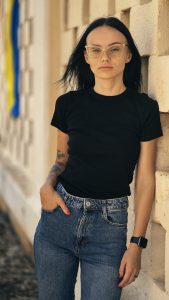
I’m from Kiev, and the war caught me completely by surprise. On February 24th I woke up at five in the morning probably from an explosion and immediately heard another explosion followed by car alarms. I live on the 18th floor of a high-rise building, and everything became even more frightening and stressful when from above I saw the neighbours getting into their cars with their belongings and leaving.
A panic was immediate. At 6 in the morning there was already a long line at the ATM. After that I stood in line for another three hours to fill up the car. I bought some necessities at the supermarket but I didn’t know what to do or where to go from there. During frequent alarms (every 10-20 minutes) I decided to go to Poltava, which is about 350 km from Kyiv.
One of the most traumatic memories engraved in my mind is from the first day of the war: the subway station in Kiev, which I hid in every time there was an alarm, was filled with families who stayed there with their belongings, their children, their dogs and cats. A horrifying picture.
The situation in Poltava wasn’t better. The same explosions, the same alarms, and the same feeling of a general panic. I decided that I had to leave the country and accepted an invitation from my sister who lives in Israel to come and stay with her. On Sunday 27th I left Poltava towards the border with Slovakia with a friend and her children, who continued from there to Poland. It took us a day to reach the border. The journey was terrible with military checkpoints everywhere, traffic jams, explosions and alarms – it was very stressful.
Now I am at my sister’s house and helping her take care of my niece. My mother and grandmother stayed in Ukraine. They live in the Dnipro region. My father serves in the Ukrainian army and is currently in a hot zone.
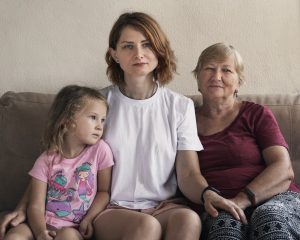
I arrived from Odessa with my daughter and my four-year-old granddaughter. On Thursday 24 in the morning we woke up to the sound of bombs exploding. Already in the afternoon, my husband drove us towards the border. He decided to stay in Ukraine, and we drove knowing that we would have to say goodbye.
Due to huge traffic jams we stopped 15 kilometres from the border, and decided to continue our journey on foot. We crossed the border between Ukraine and Moldova at night. We had to stay another week in Moldova. We stayed with good people who simply responded to a request for help on Facebook, until we were able to purchase plane tickets. And on March 1 we arrived in Israel.
We are staying with very good friends from Israel. At the beginning of the war they convinced us to get out of the battle zone immediately and without delay. Sara, my granddaughter, attends an Israeli kindergarten and is in a voluntary class for children from Ukraine. My husband, my son and his family stayed in Odessa.
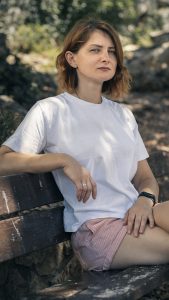

I arrived from Odessa together with my daughter and my mother. On Thursday 24th in the morning we woke up to the sound of bombs exploding. At noon we already left towards the border together with my father who decided to stay in Ukraine, and drove us knowing that we would have to say goodbye.
Due to major traffic jams we stopped 15 kilometres from the border, and decided to continue our journey on foot. We crossed the border between Ukraine and Moldova at night – my four-year-old daughter, my sixty-four-year-old mother and I. We had to stay another week in Moldova and during this time we volunteered to collect and distribute humanitarian aid to other refugees who came from Ukraine. It distracted us a bit from the alarming news. We stayed with good people who simply responded to a request for help on Facebook, until we were able to purchase plane tickets. On March 1 we arrived in Israel.
We are now staying with very good friends from Israel. They were the ones who at the beginning of the war convinced us to get out of the battle zone immediately without delay. My mother lives with us and helps a lot in the upbringing of Sara, who attends an Israeli kindergarten and is in a voluntary class for children from Ukraine. My father, my brother and his whole family stayed in Odessa. I left my cat with my father so that he wouldn’t be so lonely. After all, he stayed alone in the house where we all lived.
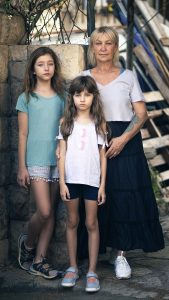
I am from Kropyvnytskyi, Kirovograd district. On Thursday, February 24 I woke up to the noise of planes, which started bombing a civilian airport near our home. I woke my daughter (Yevgenia). My granddaughters also woke up and were very scared. We spent several days debating whether to leave everything and go despite great difficulty. When we heard that they started bombing a military airport located 25 km away from us, we realized that we had no choice but to leave.
I left together with my daughter and granddaughters towards Moldova, leaving behind my husband and my daughter’s partner who serves in the Ukrainian army (as far as we know he is in Liman). We crossed the border in heavy snow and spent several hours in a tent trying to keep the girls warm the best we could until a minibus arrived and took us to a military base in Chisinau. My son’s wife from Israel contacted United Hatzalah, and they helped us to deal with the issues we had with the flight tickets we ordered from Ukraine. On March 8th, after many hardships and obstacles, we managed to board a flight to Israel.
Now we live with my son’s family, and I am full of hope that I can return to Ukraine soon. In the meantime, my granddaughters are attending school. 6-year-old Katya went to the first grade and 9-year-old Veronika returned to Taekwondo training and already won a blue belt.
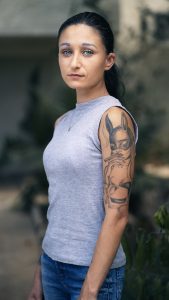
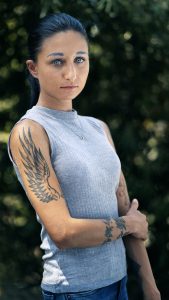
I arrived from Kropyvnytskyi, Kirovograd district, together with my mother and daughters. The war caught me completely by surprise. The day before, on Wednesday the 23 I started a new job, ironically in a Russian office.
I refused to believe that a war had really broken out, until I heard an explosion and saw combat jets in the sky. For a long time I told myself that in two weeks it would be all over. I hid the war from my daughters and made excuses. But when a missile exploded 20 km away from us, I realised that it would not end soon, and I told my mother that we were going to Israel.
My brother and sister-in-law who live in Israel, with the help of volunteers, found for us a rescue bus that goes to the border with Moldova. From there we were taken to a military base in Chisinau and with the help of the United Hatzalah organisation we were able to board a flight to Israel. During our stay in Chisinau, amidst all the chaos and confusion, I kept my sanity by helping other refugees from Ukraine with bureaucratic difficulties and filling out forms.
My mother’s husband and my life partner stayed in Ukraine. My partner is fighting in the Ukrainian army. Due to the circumstances, he rarely contacts us and it is very difficult and scary (as I know, he is in a hot zone close to the border in Ukraine).
In Israel it is not easy either: getting used to a new environment, language and new laws. The girls are starting to adapt, especially the little one, Katya, she sees the good. Veronika, the eldest, has a harder time. In Ukraine she had her own room and privacy, and here she doesn’t. The girls miss their home and hope to return to their familiar surroundings.
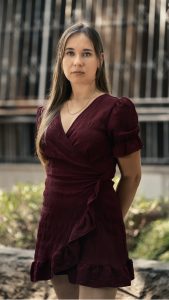
I arrived in Israel from Kiev. On the 24th of February I woke up to a noise that at first I thought was a wind. But later I realized it was a bomb explosion. Worries and a fear that a war would start were already in the air, and I was mentally prepared for it to happen. I took only documents and jewelry with me and went to a village in Zhitomirsky district. I stayed there for about a month. But soon I realized that I would not be able to escape the war there as well. I saw planes in the sky, once we saw an air combat and a plane fell. At the same time friends from Bucha started sending testimonies of the atrocities that were happening there. And I realised that I had to leave.
I booked tickets for me and my mother for the bus to Krakow. The trip there lasted 29 hours and was a nightmare. We had nothing to eat and the prolonged sitting was unbearable. The money I planned to spend on a summer vacation, I spent on plane tickets to Israel.
At first my mother and I lived at my aunt’s, my mother’s sister. A month later my mother returned to Ukraine, and I stayed here, hoping that this nightmare would end soon.
In Ukraine I just finished my dental studies and found work in this field.
I put so much effort and work into my future, and in the end I found myself in a foreign country, without parents, without any support, without any status. All I want is to live my life and make a decent living.
You are invited to the gallery in the Central Library
Haifa Help Center for Refugees from Ukraine:
Facebook – click here
Mail – HaifaForUkraine@gmail.com



